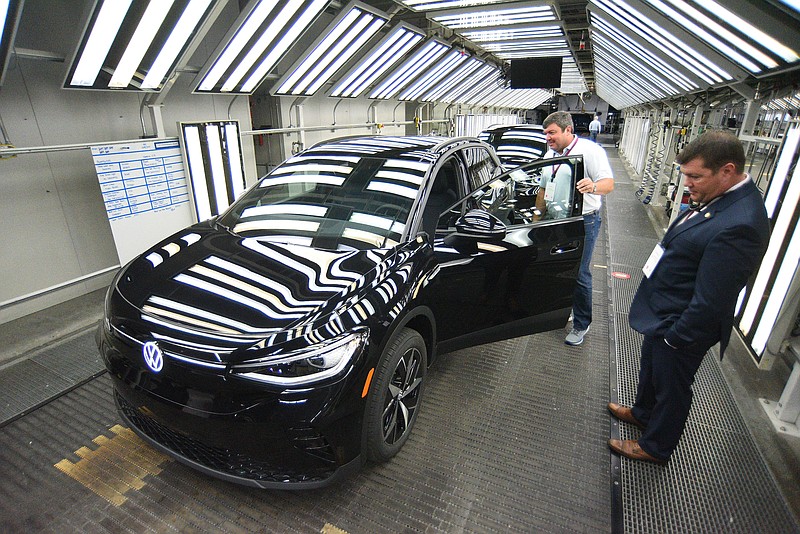Talk about bad timing.
On the day Volkswagen unveiled a new electric midsize sedan that will be sold in the United States in 2024, new U.S. Treasury Department rules that went into effect Tuesday said the Chattanooga-built Volkswagen ID.4 and more than 60 other electric or plug-in hybrids won't get any tax credits.
Tax credits for such cars were touted by the Biden administration as one of the top reasons for Congress to pass the 2022 Inflation Reduction Act, perhaps the biggest misnomer for a bill in recent history.
According to provisions of the Act, only 10 vehicles — not 10 car makers — will be eligible for the full $7,500 in tax credits. And you probably don't know anybody who drives one the vehicles.
They include the Cadillac Lyriq, the Chevrolet Bolt and Bolt EUV, the Chevrolet Silverado electric pickup, the upcoming Chevrolet Equinox small SUV, the Chrysler Pacifica, the Ford F-150 Lightning pickup, the Lincoln Aviator Grand Touring plug-in hybrids and the Tesla Model Y.
Another seven models will get $3,750 in credits.
Nine vehicles, including the ID.4, the Tennessee-made Nissan Leaf and models by Rivian, which had received credits under the previous rules, were dropped.
President Joe Biden has said he wants to have half of new passenger vehicles sold in the United States by 2030 run on electricity.
The goal is unrealistic but more so given the cost of the vehicles on which buyers would get the tax credits, which range anywhere from $26,500 for the Bolt to $70,190 for the Lincoln. And most of the cars are on the upper end of that scale.
As if the tax credits list wasn't bad enough, the average cost of a new car has risen to $48,763 in February, which has put it out of range for many Americans.
The price rise, since the COVID-19 pandemic hit in early 2020 and government spending and consumer demand drove up inflation, has been meteoric, according to the National Automobile Dealers Association.
Average new car prices at the beginning of the last decade rose less than 3% annually. The price spiked 17.2% between 2020 and 2021 and then another 11.8% in 2021. In dollars, the average price of a new car increased from $30,570 in January 2012 to $48,094 in September 2022.
However, a new electric vehicle, according to Kelley Blue Book, is nearly $10,000 higher than a gasoline-powered car.
It seems to us if Biden were serious about buyers purchasing electric cars, he would have worked with manufacturers of vehicles on the low end of the price range to encourage them to build cars more people could afford, and then give them the tax credits. Those buyers, if satisfied, would tell others what a bargain an electric car was and encourage more sales.
As it is, a $3,750 or even $7,500 tax credit is of little consequence to a luxury buyer of a Lincoln Aviator Grand Touring hybrid or a tricked out Ford F-150 Lightning pickup. If that's the vehicle they want, they will buy it regardless of the tax credit.
The new rules governing the tax credits say that for a vehicle to be eligible, it must be manufactured in North America, must not have a sticker price more than $55,000 (cars) or $80,000 (SUVs, trucks and vans), must have a certain percentage of battery minerals and components sourced in North America or from a U.S. trade partner, and must be purchased by someone whose adjusted gross income — hardly paupers — is less than $300,000 (married couples filing jointly), $225,000 (heads of households) or $150,000 (other filers).
The impulse to incentivize U.S. production of the components was the right one but unquestionably will have an effect on what cars are eligible, who buys the cars and how soon any electric vehicle sales goal can be reached, especially since the battery material requirements become stricter as the years go on.
As far as Volkswagen's new midsize vehicle, the ID.7, which is suggested as a competitor to the Tesla Model 3, it won't be eligible for tax credits since it will be produced in Emden, Germany and in China, according to the company.
Volkswagen plans to have 10 new electric vehicles launched worldwide by 2026. Company officials say they want to have the broadest number of electric vehicles in Europe by 2026, 80% of the car share on that continent by 2030 and manufacture only electric cars in Europe from 2033 forward.
Since gasoline prices have risen sharply again, some car buyer may imagine buying an electric vehicle, but the cost of the vehicles, the piddling tax credits and the lack of charging stations are likely to end such dreams. We may get there one day, but the average American must be convinced it's the right — and affordable — thing to do. They're not convinced yet.
